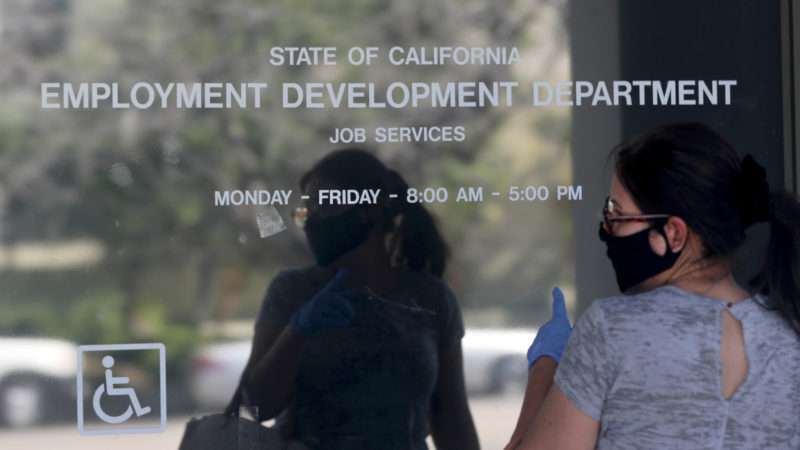
If you thought the economic toll wrought by the COVID-19 pandemic was only going to be horrendous, you may have been overly optimistic. A combination of voluntary behavior changes and government-imposed lockdowns that choked-off social and economic activity are now projected to have even worse consequences than economists initially feared. Life may start returning to normal sometime next year, but there will be lasting pain even if we avoid another wave of the virus.
“Global output is projected to decline by 4.9 percent in 2020, 1.9 percentage points below our April forecast, followed by a partial recovery, with growth at 5.4 percent in 2021,” Gita Gopinath, Director of the Research Department at the International Monetary Fund (IMF), wrote this week.
As depressing as the IMF’s numbers are, the Organization for Economic Cooperation and Development (OECD) is actually more pessimistic. The OECD predicts that, if we’re hit by only one wave of COVID-19, global economic activity will fall by 6 percent this year, with five years of income growth lost. A second wave of infections would drive world economic output down by 7.6 percent in 2020.
Despite the high number of infections in the United States, our economy may get off relatively lightly compared to some other countries. The IMF sees American economic activity dropping by 8 percent this year, compared to 10.2 percent for the Euro Area and the UK. Brazil’s economic activity is projected to drop 9.1 percent, Canada’s by 8.4 percent, Russia’s by 6.6 percent, and India’s by 4.5 percent. Japan is expected to take a 5.8 percent hit.
China, where the outbreak started, could actually eke out 1 percent of growth.
OECD projections, though more downbeat, largely bracket the IMF numbers depending on whether the world is hit once by the virus or suffers a second wave.
The reason for the grim and worsening economic outlook is both the virus and the tradeoffs inherent in shutting down economies in an attempt to stem infection.
“The COVID-19 pandemic pushed economies into a Great Lockdown, which helped contain the virus and save lives, but also triggered the worst recession since the Great Depression,” writes Gopinath.
“The lockdown measures brought in by most governments have succeeded in slowing the spread of the virus and in reducing the death toll but they have also frozen business activity in many sectors, widened inequality, disrupted education and undermined confidence in the future,” agrees the OECD.
There’s a recognition from both organizations that ordering stores and offices closed and people to stay at home may slow the spread of disease, but it comes at a cost in terms of the physical and mental well-being that depend on prosperity. Protecting good health requires not just efforts against a new virus, but also making a living so we can afford food, clothing, shelter, medicine, and the other necessities of life.
That’s not to say that lifting lockdown orders necessarily stems all of the economic carnage. We saw evidence last month that people started sheltering from the virus before they were ever told to do so, and that they started emerging from their homes before government officials gave the go-ahead. That is, people make their own decisions and aren’t just tools of government policy.
“We find that COVID-19 induced high-income households to self-isolate and sharply reduce spending in sectors that require physical interaction,” concludes a new paper from a Harvard University economic research team led by Raj Chetty. “This spending shock in turn led to losses in business revenue and layoffs of low-income workers at firms that cater to high-income consumers, ultimately reducing their own consumption levels.”
The same paper finds that government stimulus programs intended to offset pandemic-related losses are largely ineffective.
“Stimulus checks increase spending particularly among low-income households, but very little of the additional spending flows to the businesses most affected by the COVID shock; and loans to small businesses have little impact on employment rates,” write the paper’s authors (that’s without mentioning that $1.4 billion went to hard-to-stimulate dead people).
So, government officials might have the power to worsen the economic impact of the pandemic by ordering businesses closed and populations confined to their homes and by punishing those they catch in violation, but they can’t just flip prosperity back on like a light switch. People will start spending and investing when they feel confident and not because they’ve been told to do so or been handed a sum of magic money created by politicians out of thin air.
That’s unpleasant news for the many governments that have spent heavily in response to COVID-19 during a period of shrinking revenue. “Public debt is projected to reach this year the highest level in recorded history in relation to GDP, in both advanced and emerging market and developing economies,” notes the IMF’s Gopinath.
The OECD predicts a 24.49 percent increase in public debt for the United States – with another 6.83 percent in case of a second wave of the virus. That level of debt will have lasting effects on government finances, not to mention the burdens placed on taxpayers.
“Countries will need sound fiscal frameworks for medium-term consolidation, through cutting back on wasteful spending, widening the tax base, minimizing tax avoidance, and greater progressivity in taxation in some countries,” adds Gopinath.
For years to come, that is likely to look an awful lot like an accelerated game of whack-a-mole between tax collectors and a public that gets less than ever for its forcibly extracted money.
Given the realities of voluntary responses to the global pandemic, some of this pain was unavoidable. Many people were going to choose to self-isolate, reduce spending, and generally hunker down to weather COVID-19. But there’s no doubt that governments exacerbated the pain with lockdown orders that curtailed economic activity against the wishes of those who prefer to make their own decisions. Those orders made the world poorer, and less free, than it otherwise would have been.
So, hold on tight. The pandemic isn’t over, and neither is the pain caused by the virus itself as well as by the policies that are intended to hold it in check.
from Latest – Reason.com https://ift.tt/3dFH9nz
via IFTTT








